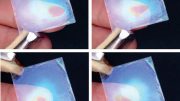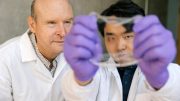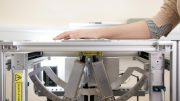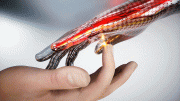
Artificial skin, also known as synthetic skin, is a man-made material that is designed to mimic the properties and functions of human skin. It is used in a variety of applications, including wound healing, cosmetic surgery, and skin research.
Researchers have created an artificial skin that surpasses human skin in its sensitivity to detect pressure applied by an object and its approach.
In a study published in the journal Small, scientists utilized the dual-responsive artificial skin for various purposes, including controlling virtual game characters, navigating electronic maps, and scrolling through digital documents. The artificial skin was able to distinguish different signals from approaching targets, enabling touchless object identification.
The advance provides a proof-of-concept application for rendering a robot to classify materials including polymers, metals, and human skin in an entirely touchless mode. The researchers note that such artificial skin can be used in next-generation engineered electronics with potential in human–machine interfaces, artificial intelligence, prosthesis, and augmented reality.
“We created artificial skin with sensing capabilities superior to human skin. Unlike human skin that senses most information from touching actions, this artificial skin also obtains rich cognitive information encoded in touchless or approaching operations,” said corresponding author Yifan Wang, an assistant professor at Nanyang Technological University, in Singapore. “The work could lead to next-generation robotic perception technologies superior to existing tactile sensors.”
Reference: “A Dual-Responsive Artificial Skin for Tactile and Touchless Interfaces” by Hai Lu Wang, Tianyu Chen, Bojian Zhang, Guohui Wang, Xudong Yang, Kunlin Wu and Yifan Wang, 26 January 2023, Small.
DOI: 10.1002/smll.202206830









Whilst I appreciate the excitement, but fail to see this anything more than another achievement in the robattic science. It appears that to make robatts more acceptable the inventors imply that their achievement has a great effect in medicine and human health!!!